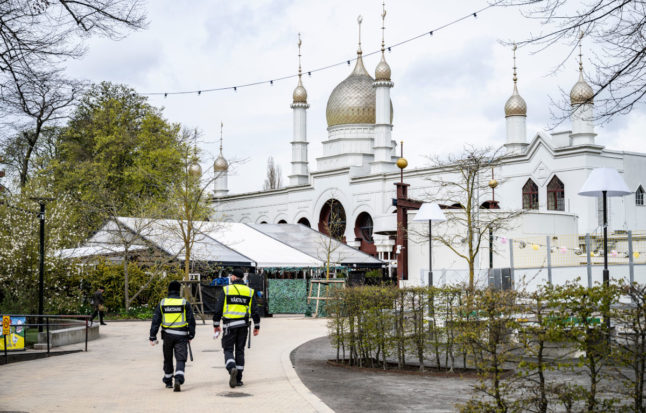THINGS TO WATCH OUT FOR
Swedes return to work – and the school year starts
In August, Swedes start heading back to the office after their summer holidays, where the majority of workers take at least a couple of weeks off during July. This means that replies to all those unanswered emails you’ve sent over the last few weeks will start ticking into your inbox as Sweden’s workers return to their desks.
In a similar vein, kids will go back to school in August, although the exact date when schools go back varies depending on where you live in the country.
Travel chaos in Europe
The chaotic travel situation seen during the past few months looks set to continue, with airports throughout Europe likely to remain busy during August. Airlines across the continent have cancelled more than 25,000 flights from their August schedule, and strikes affecting several airlines and airports in other European countries will also affect Swedish travellers planning on taking a late summer holiday.
READ ALSO: Airport chaos in Europe: Airlines cancel 15,000 flights in August
Risk of Covid-19 peak hitting Sweden in August
According to Sweden’s Public Health Agency, the amount of people infected with Covid-19 in the country could peak in mid-August. During the summer, infection rates have increased week-on-week, with more than half of Sweden’s regions reporting an increase in cases.
This is in part due to the high number of Swedes about to return to work following their summer holidays in July.
“It usually takes around two weeks from returning to work for there to be a noticeable increase,” Karin Tegmark Wisell, the Agency’s general director, told TT news wire.
Having said that, Tegmark Wisell believes the risk of having to introduce new restrictions or close schools is low.
“We can’t rule local outbreaks out,” she told TT. “In a situation where teaching can’t be carried out, the school could decide to close independently of Covid-19 legislation.”
NEW LAWS AND REGULATIONS
Hike in pay-outs to poorest pensioners
A ban on unregistered pre-paid mobile phones
Pre-paid SIM cards, known in Swedish as kontantkort or cash cards, will require registration with information including the owner’s name and personal identity number (personnummer) from August 1st.
The new rules could present difficulties for people without a personnummer, such as foreign nationals who have recently moved to Sweden, since a personal identity number is needed to set up a phone contract.
Existing pre-paid sims will continue to work without registration until February next year.
Tougher penalties for rape and buying sex
From August 1st, Sweden is bringing in tougher penalties for a range of sexual crimes. The minimum jail sentence for rape and child rape rises from two years to three. Being caught buying sex will always come with a jail sentence, rather than just a fine.
The minimum sentence for child sex abuse rises from the shortest possible prison sentence to six months behind bars, as does the minimum for ‘exploiting children through the purchase of sexual acts’. The minimum sentence for making children pose sexually rises from a fine to imprisonment.
Lower threshold for deporting criminals
From August 1st, Sweden’s government is making it easier for criminals who are foreign citizens to be deported from Sweden after serving their sentence. Criminals can now be deported for less serious crimes than previously, and they will need to give a higher level of evidence that they are established in Sweden for this to be a defence. There will also no longer be a ban on deporting criminals who came to Sweden as children. Read the full list of changes here (in Swedish).
Better rules for international female same-sex parents
A woman who is or has been married to another woman who has a child in Sweden will now automatically be considered the child’s parent, under a change designed to make Sweden’s parenting laws more equal. The change will mean that international female same-sex couples who come to Sweden will enjoy a similar status as parents under Swedish law as couples consisting of a man and a woman. The new law comes into force on August 1st.
New EU regulations to protect children caught in cross-border parental disputes
On August 1st, the EU’s new Brussels II regulation, which is designed to protect children caught in cross-border parental disputes, comes into force in Sweden. Among other changes, the new regulation imposes deadlines on courts in all EU countries when handling international child abduction cases. All courts must decide on returning a child to the parent with the right of custody within six weeks, with a further six weeks allowed for appeal. The regulations also require that the opinions of children who can express themselves play a role in proceedings. Read about the rules here.
You can see a full list of new laws coming into force on August 1st here.
Municipalities required to offer ‘cohesive adult education’ to adult immigrants
From August 1st, all municipalities are required to offer a ‘cohesive adult education’ to all adults arriving in Sweden who are covered by the Swedish Public Employment Service’s Establishment Programme. Under the new rule municipalities must offer an average of 23 hours of education a week over a four-week period, which will include parts of the Swedish For Immigrants (SFI) course, a ‘civic orientation’ course, and other education within the municipal adult education departments.
FESTIVALS
Crayfish parties
Unfortunately there are no public holidays in August, although this doesn’t mean there’s nothing to celebrate. Crayfish season traditionally starts on August 7th in Sweden, so be prepared for crayfish-themed decorations to start popping up in your local supermarket, and find some friends (preferably with access to a summer house) to hold your very own kräftskiva (crayfish party).
As with most Swedish celebrations, expect drinking songs, lots of snaps, crispbread, cheese, and most likely some sort of västerbottenpaj – a quiche featuring Sweden’s favourite cheese, västerbottensost.
Here’s our guide to six essential Swedish drinking songs for crayfish party season.
Stockholm Pride
Pride is also kicking off in Stockholm next month. Celebrations will begin on August 1st and carry on until August 7th. This year’s theme is Dags att bekänna färg (Time to profess colour) and will feature a parade on Saturday August 6th, as well as events, music and parties in Pride Park (Östermalms IP) between Wednesday August 3rd and Saturday August 6th.
Here’s a link to the programme (in Swedish).
Malmöfestivalen
For those based in the south of the country, Malmöfestivalen will be taking place from August 12th-19th. The festival will include music, activities for children, dance and art, as well as food stalls.
Way Out West
Not to leave Gothenburg off the list, Way Out West music festival will also be taking place in August, between the 11th and 19th. Unlike Pride and Malmöfestivalen, this festival isn’t free, but at the time of writing there are still tickets available.
Artists performing at the festival this year include Tame Impala, Chance the Rapper, Jamie XX, First Aid Kit and Nick Cave & the Bad Seeds.



 Please whitelist us to continue reading.
Please whitelist us to continue reading.
Member comments